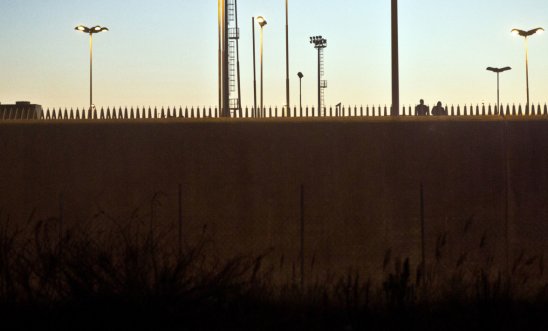
Press releases
Italy: Migrants detained in conditions 'worse than prison' - new briefing

Amnesty visits to centres in Rome and Caltanissetta in Sicily found spartan conditions with foam mattresses on concrete beds, sealed windows and mobiles prohibited
Meloni government has plans to expand its use of detention sparking fears over the proliferation of harmful prison-like conditions
‘These needless detention orders throw people’s lives, health and families into disarray’ - Dinushika Dissanayake
Migrants and people seeking asylum in Italy are being unlawfully deprived of their liberty in detention centres that are in many ways “worse than in prison”, Amnesty International said today (4 July).
Amnesty’s new 15-page briefing - Liberty and Dignity: Amnesty International’s observations on the administrative detention of migrant and asylum-seeking people in Italy - shows the impact of new measures adopted by the Italian government last year to expand the use of migration-related detention.
The measures included plans for the construction of new detention centres, increasing the maximum detention time ahead of repatriation to 18 months, and the application of “border procedures” for people seeking asylum from “safe countries” resulting in the automatic detention of people on the basis of their nationality, contrary to international law which requires an individual assessment.
In light of these developments and consistent reports of substandard conditions of detention and treatment, Amnesty recently visited two detention centres - Ponte Galeria in Rome and Pian del Lago in Caltanissetta in Sicily.
Amnesty found that conditions in the centres failed to meet applicable international law and standards. The centres appeared to restrict detainees’ movement to an excessive degree, while furniture and bedding were extremely basic, with foam mattresses placed on concrete beds. Bathrooms were in poor condition and sometimes lacked doors, while light switches were turned on and off by guards, windows were permanently closed and personal smartphones were prohibited. These conditions violate people’s right to dignity and must be urgently improved by the Italian authorities.
Plans to build new centres in Italy, combined with the introduction of mandatory border procedures under the EU Pact on Migration and Asylum and the upcoming implementation of the Italy-Albania agreement, make action ever more urgent to prevent further violations of international law that will affect an increasing number of people. Migration-related administrative detention must not have a punitive character and should not impose prison-like conditions.
In the exceptional cases for which detention is deemed necessary and proportionate, said Amnesty, rigorous and regular assessments of people’s suitability for detention must be conducted by the Italian authorities.
Dinushika Dissanayake, Amnesty International’s Europe Deputy Director, said:
"People seeking international protection should not be detained.
“These needless detention orders throw people’s lives, health and families into disarray.
“In the centres we visited we encountered people with severe mental health problems.
“People are forced to spend all their time in fenced spaces in conditions that are in many ways worse than in prison and are denied even a modicum of autonomy.
“Despite lengthy detention periods, there is an almost total absence of activities, which, combined with a lack of information about their future leads to enormous psychological harm among the people detained.
“The failure of the Italian authorities to set up an effective system of alternatives to detention combined with an inadequate legal process overseen by non-professional judges is leading to an abuse of detention.
“The Government must ensure that conditions in detention centres respect human dignity, providing appropriate, safe accommodation and opportunities for individuals to be in contact with the outside world and to use their time in meaningful ways.”
On 11 June, Amnesty sent a letter detailing its findings to the Italian ministers of interior, justice and health. On 24 June, the Department for Civil Liberties and Immigration and the Department for Public Security of the Ministry of Interior provided replies, and their contents are reflected in the briefing.